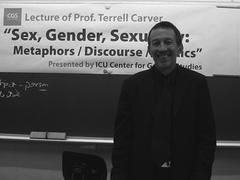 In introducing himself, Professor Carver, from the University of Bristol in the United Kingdom, mentioned that he was influenced by Judith Butler's books, Gender Trouble and Undoing Gender. He was also largely influenced by R.W. Connell's book, Masculinities. During his talk, he promised to hit on the following three points:
In introducing himself, Professor Carver, from the University of Bristol in the United Kingdom, mentioned that he was influenced by Judith Butler's books, Gender Trouble and Undoing Gender. He was also largely influenced by R.W. Connell's book, Masculinities. During his talk, he promised to hit on the following three points:
Professor Carver's main argument was that there is a strong need to look at sex, gender, and sexuality together, as interconnected ideas and concepts. In order to make this point, he first explained how these concepts have changed and evolved in the last ten years.
Professor Carver explained that the issue of sex used to be a biological fact, and gender followed one's biological sex. We now recognize that we can change ourselves, people can have extra chromosomes, extra hormones, may not be able to reproduce biologically, etc. The biological distinctions no longer seem clear, nor do some people want them to be clear. Some people are happy with the ambiguity their biological make-up offers them. The many words now used to describe the concept of a parent (mother, father, egg mother, sperm father, womb mother, adoptive mother, adoptive father, etc.) can be quite confusing.
Gender used to be defined as a behavioral pattern defined by our sex and society. Judith Butler helped change this concept, and argued that gender reflects repetitious social action. It is performative. We have the idea that men and women are different, because that is what we have been told, and we continue to support it. We create power relationships and don't dispute the idea that men have more power than women.
Sexuality has changed the gay liberation movement. We see in society that there are more acceptable sexual behaviors especially now where issues such as gay marriage are permissible. We question what might be normal or abnormal, legal or illegal. We look for answers in books and religious circles.
Professor Carver argues that we must look at sex, gender, and sexuality all together and not as individual characteristics. They are inter-related, intricately linked and cannot be separated into different entities or issues independent of the others. He gave two current examples to help us understand why sex, gender, and sexuality must be studied in combination. In the UK, two new laws are being discussed. First is the "Gender Reassignment Bill" which describes what one needs to do legally (i.e. birth certificates, marriage certificates, adoptions, etc) to change genders. The law says that one needs to "live successfully in the gender." Professor Carver questioned the meaning of "live successfully." Who defines this and who is the judge of whether or not someone is successful? These questions aside, the law will allow one to change genders and all records of one's former self will be erased. The second law under discussion is the "Civil Association Law" which would be available to same sex couples. It essentially provides most marriage benefits (inheritance tax, benefits, etc) as traditional marriages, but it may be more difficult to divorce. Professor Carver seemed to be amused by these two laws. The Civil Association Law is available only to same sex couples. The criticism seems to be that it should be available to all couples, or simply make same sex marriage legal, especially in light of the Gender Reassignment Bill, in which one can essentially choose one's gender.
During his talk, Professor Carver posed questions and gave examples regarding men and masculinities. He asked, "why do men get away with the power they have?" Awful things happen in the world, and they are often done by men, usually to other men. In the current world of mass destruction there are increasing numbers of evil acts performed against women and children. He began talking about the concepts of being overtly and covertly gendered. "Men," he says, "don't think of gender." They are described as human. Men are normal, women are different. Men are fathers if they feel like it. They are a person, or an abstract human subject. Feminists exposed that the normal, abstract, human subject, the person, is not woman.
Professor Carver concluded his talk with an interesting diagram using ordinary language categories such as natural and unnatural, male and female, and traditional and transgressive, on overlapping continuums. The resulting graph shows that the closer we are in the middle of each continuum, the more safe and certain we feel, while the further out we are on each continuum, the more disturbance there seems to be. On the diagram were various categories of people, such as the stay-at-home father and even examples of people such as Jesus. The diagram helped reinforce the uncertainty of the terms sex, gender, and sexuality.
I found Professor Carver quite engaging in his presentation. He used many concrete examples in order to illustrate his point, and I believe he provoked a lot of thought and questions among the audience. I enjoyed his talk very much.
ICU Exchange Student : Cara Fantini